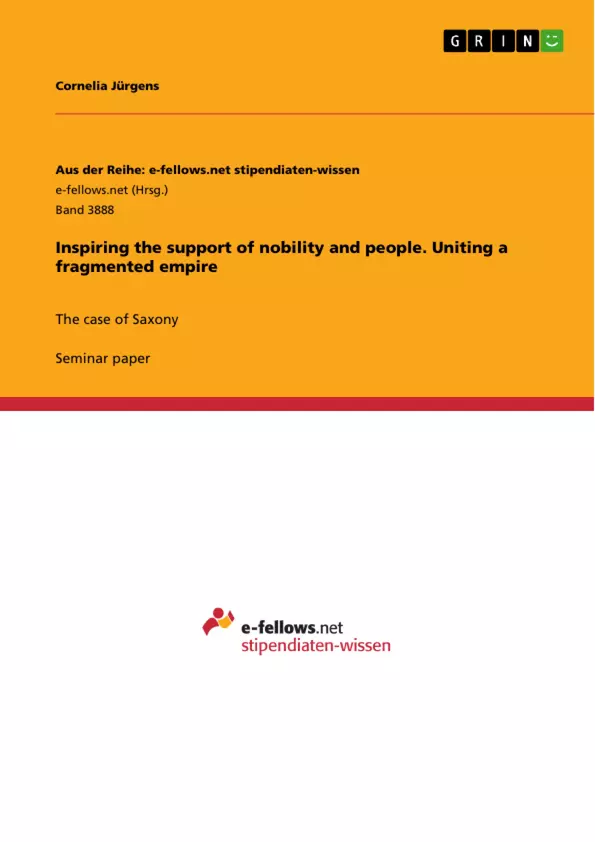In 1871, the German empire was proclaimed in Versailles. This marked the beginning of Germany's rise as an imperial power and eventually led to its militarization and the rise of fascism. It was not the first time that there was some form of a German state, but it was the first time the territory was actually consolidated under direct rule and a uniform culture. Accordingly, this was the first time the states that considered themselves German had to seriously adapt to a ruler. How did this work in Saxony?
Previous attempts to unite the German states, specifically the Holy Roman Empire and the Frankfurt Parliament of 1848, failed at the consolidation of their power over the different states. For a long time, the German states were connected through some common culture and language but were always fragmented in their political structure. The measures enacted by the first emperor and his chancellor successfully challenged this fragmentation by appealing to both the nobility and the ordinary people, the repercussions of which can still be felt even today, both on an international scale and locally. Especially Saxony is an interesting state to investigate during this time, as it was once one of the most powerful German speaking states in the middle ages, had a complicated relationship with Prussia, and is even now the centre stage for a lot of current political debates in Germany.
Inhaltsverzeichnis (Table of Contents)
- Introduction
- 1. The remainders of autonomy.
- 2. Nationalism and uniformity..
Zielsetzung und Themenschwerpunkte (Objectives and Key Themes)
This essay explores the process of state formation in Saxony during the unification of the German empire in 1871. It examines how the newly formed empire managed to unite a fragmented territory by gaining the support of both nobility and the general population.
- The degree of autonomy granted to Saxony within the empire
- The role of nationalism in uniting the German people
- The challenges of achieving uniformity in a diverse territory
- The balancing act between local power and imperial control
- The economic importance of Saxony within the German empire
Zusammenfassung der Kapitel (Chapter Summaries)
The first chapter, "The remainders of autonomy," analyzes the level of self-governance granted to Saxony within the newly established German empire. It examines the reasons behind Prussia's decision to allow Saxony some degree of autonomy despite its history of opposition. The focus lies on the political and economic considerations that played a crucial role in shaping Saxony's position within the empire.
Schlüsselwörter (Keywords)
Key terms that characterize this text include state formation, German empire, Saxony, autonomy, nationalism, uniformity, heterogeneity, nobility, dynastic continuity, economic power, and regionalism. The essay focuses on analyzing the interplay of these factors in shaping the political and social landscape of Saxony during the late 19th century.
Frequently Asked Questions
How was the German Empire unified in 1871?
The unification was achieved by consolidating territory under direct rule and appealing to both the nobility and the common people through nationalism and uniform culture.
What was Saxony's position in the new empire?
Saxony was a powerful German-speaking state that maintained a degree of autonomy despite its complicated relationship with Prussia.
Why did previous attempts at German unification fail?
Earlier attempts, like the Holy Roman Empire and the Frankfurt Parliament of 1848, failed due to a lack of consolidated power over fragmented political structures.
What role did the chancellor play in this process?
The chancellor and the first emperor enacted measures that successfully challenged fragmentation and created a uniform imperial structure.
How did the empire balance local power and imperial control?
The empire granted certain states like Saxony remainders of autonomy to ensure dynastic continuity and economic stability while enforcing national uniformity.
- Quote paper
- Cornelia Jürgens (Author), 2020, Inspiring the support of nobility and people. Uniting a fragmented empire, Munich, GRIN Verlag, https://www.hausarbeiten.de/document/1119524


